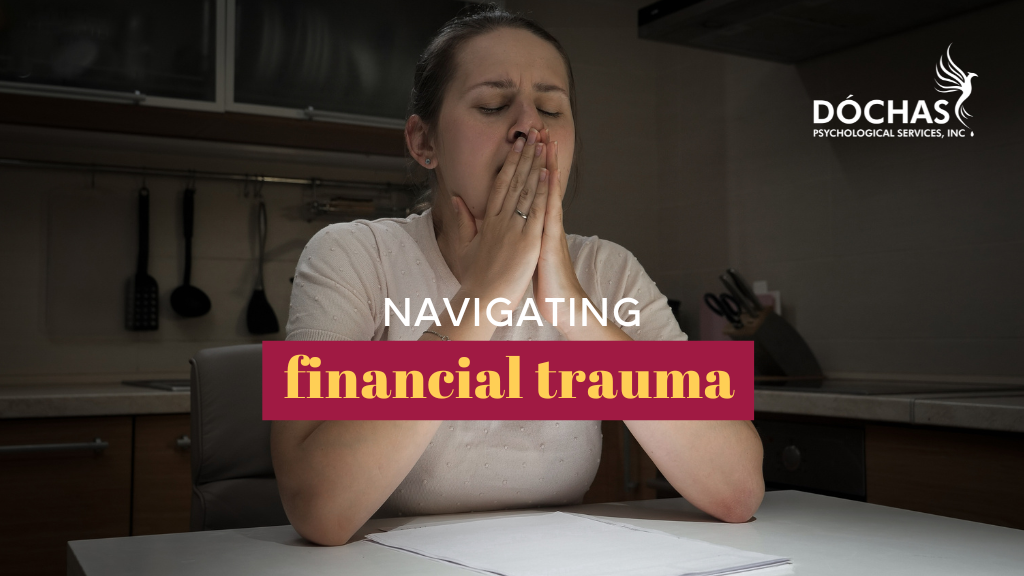There are many kinds of trauma, but have you ever heard of financial trauma? It’s Nyamal on the Dóchas blog today, and I want to dive into this topic.
In my work as a financial counsellor, I have seen the real impact of finances on mental health. Many of my clients at Money Mentors have experienced some form of financial trauma such as deep buyer’s remorse, foreclosure, layoff, or a costly, contentious divorce. They experience shame, depression, and fear around their finances. If you can relate to feeling impacted mentally because of your financial situation, you’re not alone. Here are the signs of financial trauma, and some tips to navigate it.
Why Financial Trauma Matters
First, a bit about me! I am an accredited financial counsellor (AFCC®) through the Association for Financial Counseling & Planning Education (AFCPE). That has been my full-time employment for 7+ years when I am not at Dóchas during my practicum internship. This is what led to my fascination with this topic, and confirmed my desire to pursue a master’s in counselling psychology. There’s such a profound connection between money and the mind.
People experience all kinds of financial issues, from financial infidelity, fraud, illness that leads to financial ruin or disruptions, emotional pain from an estate battle or inheritance dispute, financial abuse, addictions that result in negative consequences, to compulsive spending as a result of poor mental health or childhood adversity. These clients have unique stories, and it is a privilege to be able to hold space for them and support them during difficult times.
Understanding Financial Trauma
So what is financial trauma? Financial trauma is not an official disorder, and there is no consensus on the definition. However, it can be triggered by overwhelming debt, threats to financial stability, job loss, poverty, financial abuse, other financial stress, or adverse financial circumstances. It can impact your quality of life, relationships, and overall health.
Some signs and symptoms to look out for are: excessive fear and worry, sleep disturbances, hiding debts or spending, relying on credit, struggling to meet your basic needs (e.g., medication, food, shelter, etc.), debilitating shame, hopelessness, or a negative view of yourself or the world around you.
Healing Strategies
Ok, so you recognize you’re experiencing financial trauma—what do you do?
First, make sure you have a support system, and reach out to others. This can include therapy, support groups, and safe people in your life. You might feel isolated and limited in your social support right now, but there are resources and groups out there to help you (such as Money Mentors)! And there are low-cost or no-cost options for therapy, including here at Dóchas.
Next, practice self-care and self-compassion. It’s common for people in tough financial situations to feel bad about themselves and blame themselves. You are not alone in struggling with your financial situation, and it doesn’t reflect on your value as a person! Take care of yourself, including your physical needs such as food and sleep, as well as engaging in activities you enjoy.
Build a Healthy Financial Mindset
The last thing you can do is to build a healthy financial mindset. Many of us are just never taught about how finances work or the best ways to manage money. It’s not your fault! But you can start now to learn some of the tools you can use for the rest of your life.
Next, set realistic financial goals and expectations that reflect your values instead of those around you or what society may say. Having small, achievable goals will build your confidence.
One last tip is to embrace a growth mindset. This is believing that your basic abilities can be developed—that you can grow. You’re not stuck in your current situation nor are you defined by it, but rather you can learn to do things differently and see the change in your life.

If you think financial trauma is negatively impacting you, please seek support through a therapist with a trauma-informed lens, and those around you that you trust and feel safe with. There are also resources available online and through a mental health professional to help you practice self-care and self-compassion as you navigate these difficulties. Lastly, remember that you can contact agencies like Money Mentors, an unbiased non-profit organization, to help with your financial situation. Remember, you are not alone in this!
If you’d like to talk to one of us here at Dóchas, reach out to us at 780-446-0300 or at info@dochaspsych.com.
About Dóchas Psychological
Dóchas Psychological Services is a well-established and trusted therapy clinic located in Spruce Grove, Alberta. At Dóchas we value the idea that everyone deserves a safe space. Through connection and education, our team works hard to build a trustworthy relationship with each of our clients. It is our goal to create a community for our clients to feel like they belong.
Disclaimer
Information provided through Dóchas Psychological Services blogs or vlogs is meant for educational purposes only. They are NOT medical or mental health advice. You can read more about our disclaimer here.









